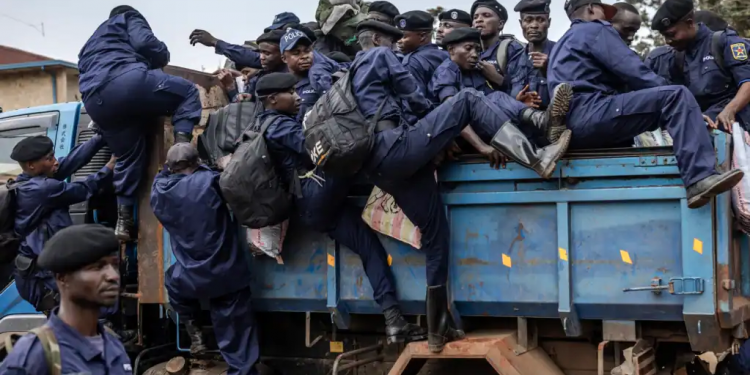Crowds of Congolese police officers who defected to the M23 rebel group gathered in Bukavu on Saturday, clapping and singing as they prepared for retraining under the rebels’ authority. The scene underscored the M23’s determination to entrench its control and establish governance in the occupied city.
The rebels advanced into Bukavu a week ago without resistance, leading to widespread looting and unrest as Congolese forces withdrew. Their capture of key areas in the eastern Democratic Republic of Congo (DRC), rich in valuable minerals, has sparked fears of a broader conflict. On Friday, the United Nations Security Council unanimously demanded that M23 halt hostilities and withdraw, but there were no signs of compliance in Bukavu.
Wearing new uniforms and black berets, the surrendered officers were informed they would undergo training before returning to support the rebels.
“May you come back to us in good shape so that together we can continue to liberate our country,” said Police Commander Jackson Kamba.

According to Lawrence Kanyuka, spokesperson for the AFC rebel alliance that includes M23, approximately 1,800 police officers have surrendered and begun retraining, with 500 more expected to follow.
The Congolese government has not responded to the developments. Meanwhile, the crisis continues to escalate, with the DRC government officially designating M23 as a terrorist organization, while the United Nations and the United States classify it as an armed rebel group.
Local residents remain skeptical about the rebels’ presence. “The M23’s arrival in Bukavu has paralyzed life here, even if some activities are resuming,” said resident Josue Kayeye. “We cannot applaud anything done by force.”
The Congolese military is under pressure on multiple fronts. On Friday, the town of Minembwe in South Kivu, along with its airfield, fell to a Tutsi militia allegedly aligned with M23. The group’s leader, Colonel Makanika, was killed days earlier by a Congolese military drone, according to local and military sources.
Regional leaders are attempting to address the crisis. East African defense chiefs met in Nairobi, Kenya, on Friday to assess the situation. An internal report from the meeting, seen by Reuters, noted that “no clear picture of the situation on the ground” exists amid the escalating violence. The report emphasized the need for direct engagement between all parties involved in the conflict.
However, the Congolese government has repeatedly refused to negotiate with M23.
The ethnic Tutsi-led rebel group is the latest in a series of armed factions that have taken up arms in the name of Tutsis in the DRC. The M23 and the Rwandan government deny accusations that Rwanda is backing the group to exploit the region’s gold and coltan reserves.









